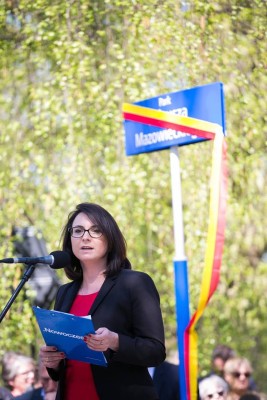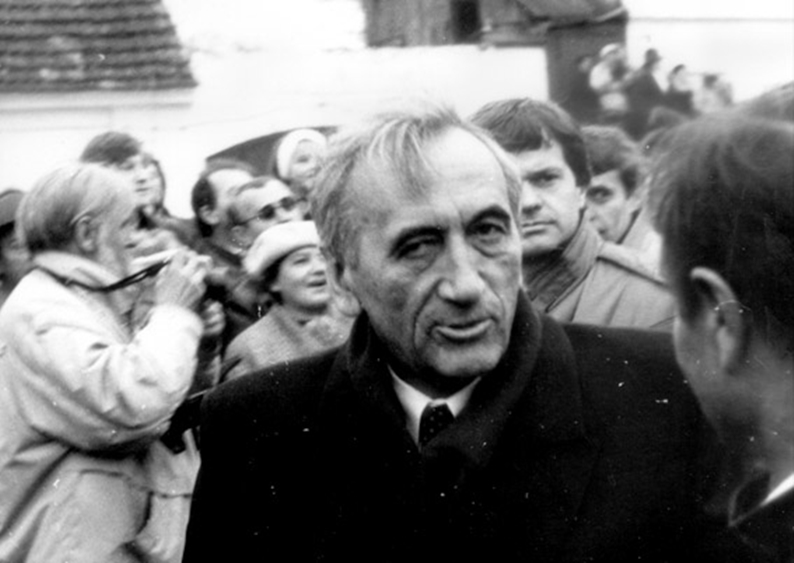In Poland, official ceremonies to announce new patrons of public spaces often revive memories of old, but not so good, times. Yet, last week, there was one particular event that could, and hopefully will, trigger a positive reflection. On the day when Tadeusz Mazowiecki would celebrate his 91th birthday, the city of Warsaw honoured the first Prime Minister of free Poland by naming after him one of the city’s parks.
During his decades in public service, both in communist and democratic Poland, Tadeusz Mazowiecki consistently demonstrated that he was never searching for his personal popularity or position. I am convinced that he would not be glad to see a park named after him.
Mazowiecki was a man of values and ideas. The only thing that could give him a sense of satisfaction would be to see that the ideas he fought for so persistently constitute a stable foundation of public life, both in Poland and Europe. Let me take the opportunity to recall two examples of such values, the ones that we have been so dramatically missing in the last years: a dialogue-based political discourse and the struggle for Polish-German reconciliation as a foundation of peace and co-operation in Europe.

Kamila Gasiuk-Pihowicz (.Nowoczesna) recalls Tadeusz Mazowiecki’s philosophy of dialogue || Photo by Marta Kamińska
The idea of dialogue underpinned Mazowiecki’s philosophy and all his actions in the public sphere. In the communist times, he was a Member of the Polish Parliament. Despite a profound disagreement with the communist authorities, Mazowiecki was persistently searching for constructive ways of action in order to limit the impact of the authoritarian regime on the society – at the same time remaining very loyal to his values. On the other hand, he was navigating between various wings of the democratic opposition: bringing together conservative bishops and left-wing children of the 1968 revolution. In the end, Polish democracy was obtained thanks to mutual cooperation. Tadeusz Mazowiecki always opposed drawing the so-called “chalk circles” – imaginary boundaries that divide the society based on religion, race, economic status or other factors. Conversely, he always treated his partners with respect, even if their views were different and at times hostile.
Tadeusz Mazowiecki was an architect of the Polish “Round Table” negotiations, a process that paved the way for democracy, but which required an honest compromise with the people who fought very brutally against him and his ideas for many decades. He was also a co-author of the current Constitution of the Republic of Poland, based on a very broad political compromise. The preamble of this Constitution, very uniquely in the Polish context, referred to values such as “truth, justice, good, and beauty”, which are shared by those “who believe in God as their source” and “those who not share such a belief but respect these universal values as arising from other sources”. This way, Mazowiecki’s philosophy of dialogue made its way to the key Polish legal act, creating a space for co-operation beyond religious and ideological divisions.
The Mazowiecki Park in Warsaw is located in the backyard of the German Embassy. There could not be a more symbolic place. It reminds of Mazowiecki’s historical role in the process of Polish-German reconciliation. This role is by far not limited to the iconic meeting with Helmut Kohl in Krzyzowa – a Silesian village which witnessed German anti-Nazi movement and from where the German Chancellor departed to react to the falling of the Berlin Wall. Tadeusz Mazowiecki had been actively supporting Polish-German reconciliation at the level of the civil society already much earlier, in particular by gaining the support of the Catholic Church for the process. These actions required a true courage, as the Polish peoples’ painful emotions were at that time far more vivid and one could much easier leverage on them to revive the fear. Sadly, some politicians in Warsaw try to awaken these demons of the past once more and use them to consolidate their political power.
Mazowiecki proved that the strategy of dialogue, instead of political games and manipulation, is really the one that enables achieving big goals. Following this path in public life would be the best, if not the only way to honour Tadeusz Mazowiecki. The recent decision of the two main opposition parties in Poland – Nowoczesna and Civic Platform – to emabrk on a closer cooperation in the forthcoming 2018 municipal elections is a step in this direction. Our programmes and priorities may differ in details, but we were able to have a constructive discussion and agree on common values. Only honest cooperation can help us defeat Law and Justice and ultimately restore the rule of law in Poland. This is our greatest goal for now.



